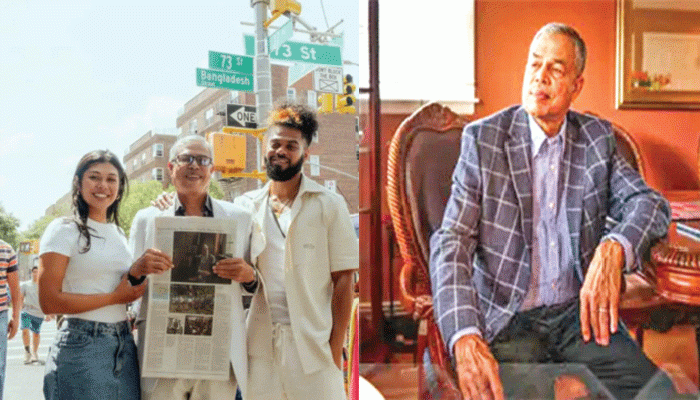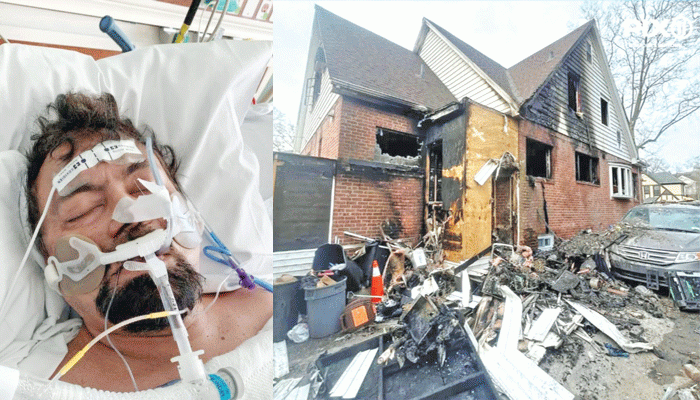বাংলাদেশি আমেরিকান গোলাম মোস্তফা খান মিরাজ। কমিউনিটির একজন অতিপরিচিত মুখ। কমিউনিটির গণ্ডি পেরিয়ে তার পরিচিতি ছড়িয়ে পড়েছে যুক্তরাষ্ট্রের মূলধারাতেও। তিনি একজন বীর মুক্তিযোদ্ধা। তার জীবনকাহিনি, বাংলাদেশে তার জীবন, যুদ্ধে অংশগ্রহণ, সেখানকার রাজনৈতিক জীবনসহ জীবনের বিভিন্ন পর্যায়ের সংগ্রাম, প্রিয় মাতৃভূমি বাংলাদেশ থেকে গোলাম মোস্তফা খান আমেরিকায় আসা, আমেরিকায় আসার পর এখানকার সংগ্রাম, আমেরিকায় প্রতিষ্ঠিত হওয়ার গল্পসহ বিভিন্ন জীবনগাথা তুলে ধরা হয়েছে।
গোলাম মোস্তফা খান মিরাজকে নিয়ে নিউইয়র্ক টাইমসের অনলাইনে একটি প্রতিবেদন প্রকাশিত হয় ১৪ জুন, এর পাশাপাশি ১৮ জুন নিউইয়র্ক টাইমসের প্রিন্ট ভার্সনে এক পৃষ্ঠাজুড়ে প্রতিবেদন প্রকাশিত হয়। তার ওপর এই প্রতিবেদন প্রকাশ করার পর এটাকে বড় সাফল্য হিসেবে বিবেচনা করছেন বাংলাদেশি কমিউনিটির গুণীজনেরা। কারণ তিনিই সম্ভবত নিউইয়র্কে প্রথম ব্যক্তি, যাকে নিয়ে পূর্ণ পৃষ্ঠার প্রতিবেদন প্রকাশিত হলো। তার জীবন, সাফল্য নিয়ে সংবাদ প্রকাশিত হওয়ার পর অনেকেই তাকে অভিনন্দন জানান। তার এই প্রতিবেদন প্রকাশ করার পর এটি নিয়ে একটি অনুষ্ঠানও হতে পারে।
তাকে নিয়ে প্রতিবেদন প্রকাশের বিষয়ে অনুভূতি জানতে চাইলে গোলাম মোস্তফা খান মিরাজ বলেন, নিউইয়র্ক টাইমস ২০২১ সাল থেকে আমার সঙ্গে যোগাযোগ করে। এরপর ক্রমাগত তিন বছর তারা আমার সঙ্গে সম্পর্ক রেখে যাচ্ছিল। তারা দিনের পর দিন খোঁজখবর করছিল যে তারা আমাকে নিয়ে ইন্টারভিউ করবে কি না? প্রতিবেদন প্রকাশ করবে কি না? তারা ভারতের কলকাতা থেকে শুরু করে আমার কমিউনিটির বিভিন্ন মানুষের কাছে খবর নিয়ে কথা বলেছে। আমি যে পরিচয়ে এখানে পরিচিত, সেই পরিচয়গুলো সত্য কি না, মানুষ আমার সম্পর্কে কী জানে সেসব তথ্য জোগাড় করেছে। তারা সব বিষয়ে সত্যতার প্রমাণ পেয়েছে। আমি বিভিন্ন সময়ে যেসব পুরস্কার পেয়েছি, তাও তারা যাচাই করে দেখেছে।
তিনি বলেন, যেদিন আমাকে নিয়ে নিউইয়র্ক টাইমস প্রতিবেদনটি প্রকাশ করে, তখনো ভাবতে পারিনি কী হতে যাচ্ছে। কারণ এই ইন্টারভিউটির জন্য তারা দুই বছরের বেশি সময় নিয়েছে। কয়েকবার আমার সঙ্গে বসেছে। আমার বাসায় এসেছে। আমার স্ত্রী, আমার পরিবারের সদস্যদের সঙ্গে কথা বলেছে। আমার কলিগ, আমার মুক্তিযুদ্ধের সময়কালীন বন্ধুসহ কমিউনিটির অনেকের সঙ্গে তারা কথা বলেছে। ইন্টারভিউটি এরই মাসের শুরুতে ফাইনাল করা হয়েছে। এর আগে সাত-আটবার বৈঠক হয়েছে, কথা হয়েছে, ছবি তুলেছে। আমি কয়েকটি প্রোগ্রাম করেছিলাম, সেই প্রোগ্রামেও ওই প্রতিবেদক উপস্থিত থেকেছেন। দেখেছেন আমাকে নিয়ে যে কথাগুলো লিখতে যাচ্ছেন, সেই কথাগুলো ঠিক কি না। আসলে তাদের প্রতিবেদন করার সিস্টেমটি অনেক গভীর এবং বিশেষ ধরনের।
গোলাম মোস্তফা খান মিরাজ আরও বলেন, আমার বাংলাদেশে মুক্তিযুদ্ধে অংশগ্রহণ থেকে শুরু করে ছাত্ররাজনীতিসহ বিভিন্ন বিষয় উঠে এসেছে। যুক্তরাষ্ট্রে আমি আসি ১৯৯২ সালে। এখানে আসার পর ম্যাকডোনালসসহ বিভিন্ন প্রতিষ্ঠানে কাজ করেছি। একপর্যায়ে ম্যানহাটনে চাকরি নিয়েছি। আমার এ দেশে প্রতিষ্ঠিত হওয়ার বিষয়টি এতটা সহজ ছিল না। অনেক সংগ্রাম করতে হয়েছে। তারা আমার ছেলে অনিক খান এবং আমার মেয়েদের সঙ্গেও কথা বলেছে।
তিনি বলেন, ইন্টারভিউর একেকটি সেশন অনেক সময় পাঁচ ঘণ্টা, কোনো কোনো সময় তিন ঘণ্টা করে চলেছে। তারা যেসব কথা বলেছে এবং বিভিন্ন ধরনের ছবি তুলেছে, এর সবগুলো ব্যবহার করেনি। তবে আগামী দিনে তারা কোনো ডকুমেন্টারি করবে কি না, তা আমার জানা নেই। এত দিন লাগার কারণ হিসেবে আমার কাছে মনে হয়েছে, তারা দেখতে চেয়েছে আমি যা বলছি তা ঠিক কি না।
মিরাজ বলেন, আমি সত্যিই নিউইয়র্ক টাইমসের এই প্রতিবেদন প্রকাশ হওয়ার পর ভীষণ খুশি। যেদিন পেপারটি দেখেছি, সেদিন আমি কেঁদেছিলাম। এই কান্না আনন্দের। বাবা দিবসে আমি এই উপহারটি পেয়েছি। আমার জীবনে যত উপহার পেয়েছি, এর মধ্যে এই উপহারটি সেরা। কারণ প্রতিবেদনে তুলে ধরা হয়েছে আমার যুদ্ধজীবন। এত সুন্দর, সাবলীল, বলিষ্ঠভাবে উপস্থাপন করা হয়েছে, এটি আসলে আমার কল্পনাতেও ছিল না।
তিনি বলেন, আমি একজন মুক্তিযোদ্ধা। আমরা বাংলাদেশে যথাযথ সম্মান পাইনি। বাংলাদেশ আসলে সেভাবে আমাকে মূল্যায়ন করেনি। অনেক হাইব্রিড এখন কাজ করছেন। আসলে এগুলো দেখলে দুঃখ হয়। বঙ্গবন্ধু আমাকে নির্দেশ দিয়েছিলেন দেশের জন্য কাজ করতে হবে। সে হিসেবে তার আদর্শ মেনেই কাজ করেছি, এখনো করে যাচ্ছি। বঙ্গবন্ধু আমার সরাসরি লিডার।
গোলাম মোস্তফা খান মিরাজ বলেন, আমার সাক্ষাৎকারটি গ্রহণ করেছেন নিউইয়র্ক টাইমসের সাংবাদিক অ্যালেক্স টার্ব। ছবি তুলেছেন জন মার্ককুইজ। সব মিলিয়ে বিষয়টি অনেক আনন্দের।
তিনি বলেন, নিউইয়র্ক টাইমসের এক পৃষ্ঠাজুড়ে যদি ড. ইউনূসকে নিয়ে কোনো প্রতিবেদন প্রকাশিত হয়, তাহলে আমি অবাক হব না। কারণ তিনি নোবেল বিজয়ী। আবার রবীন্দ্রনাথ ঠাকুরকে নিয়ে যদি প্রতিবেদন প্রকাশিত হয়, তাহলেও অবাক হব না। কারণ তিনি নোবেল বিজয়ী, তিনি একজন বিশ্ববিখ্যাত কবি। বাংলাদেশের প্রধানমন্ত্রীকে নিয়ে প্রতিবেদন প্রকাশিত হলেও অবাক হব না। কারণ তিনি দেশের প্রধানমন্ত্রী। কিন্তু আমি একজন সাধারণ মানুষ। আমাকে নিয়ে এই প্রতিবেদন প্রকাশ করায় আমিও বিস্মিত। এত বড় করে, এত সুন্দর করে তারা আমাকে উপস্থাপন করবে, এটি কল্পনাতীত ও আশাতীত।
গোলাম মোস্তফা খান মিরাজ এক পরিচিত নাম। ‘যুদ্ধে স্বাধীনতা’ (১৯৭১ এর বীর মুক্তিযোদ্ধা ও ৭৫ সালে জাতির জনক বঙ্গবন্ধু হত্যার প্রতিবাদে সশস্ত্র প্রতিরোধ যোদ্ধার আত্মকথা) শিরোনামে তার একটি গ্রন্থ প্রকাশিত হয়। একুশে গ্রন্থমেলা ২০২৩ সালে বইটি প্রকাশ করে তৃণলতা প্রকাশনী। কলকাতায় বইটি পরিবেশনা করছে নয়া উদ্যোগ, বাংলাদেশে পরিবেশক অতিক্রম। বইটি বঙ্গবন্ধু শেখ মুজিবুর রহমানকে উৎসর্গ করা হয়েছে।
বীর মুক্তিযোদ্ধা গোলাম মোস্তফা খান মিরাজ ১৯৫১ সালের ৩০ জানুয়ারি তৎকালীন ফরিদপুর জেলার অন্তর্গত গোপালগঞ্জ মহকুমার সদর থানার পাড়কুশলী পূর্বপাড়ায় খান পরিবারে জন্মগ্রহণ করেন। ১৯৭১ সালে মহান মুক্তিযুদ্ধে ভারতের বীরভূম জেলার চাকুলিয়ার ট্রেনিং সেন্টারে ট্রেনিং সম্পন্ন করে ভারতের পশ্চিমবঙ্গের বাকুলিয়া ক্যাম্প থেকে ৯ নং সেক্টরে গোলাপগঞ্জ আউড়াকান্দি স্কুলের ক্যাম্পে যোগদান করেন। পরবর্তী সময়ে মুক্তিযুদ্ধে অংশ নেন। মুজিব বাহিনীর সদস্য হিসেবে মুক্তিযোদ্ধার সার্টিফিকেট অর্জন করেন।
অনলাইন এডিশন ছাড়া প্রিন্ট এডিশনে লেখা হয়েছে ‘রিমেম্বারিং এ রেভোলেশন দ্যাট সো ম্যানি ফরগট’ শিরোনামে প্রতিবেদন প্রকাশিত হয়।
নিউইয়র্ক টাইমসের প্রতিবেদনে মিরাজকে নিয়ে শিরোনামে অনলাইনে প্রতিবেদনে লেখা হয়েছে : (He Was a Revolutionary at the Birth of a Nation. Does Anyone Care?
From freedom fighter to war hero to business leader to immigrant cabdriver, one man’s quest to keep his past alive in a new land.)
On a rainy night last month, down an alleyway in the Jackson Heights section of Queens, in a restaurant basement, sat about two dozen retirees. There was a onetime federal tax agent, a retired car salesman, a former pharmacy cashier and several taxi drivers who had shut off their meters for good.
One of these men, Golam Khan, a 72-year-old ex-cabby, was in charge. He put his arm around other gray-haired men and whispered instructions. He cleared the front row of seats for a few distinguished guests.
After some introductory speeches, Mr. Khan stood before the crowd at a lectern on a raised stage. He cast his mind to their faraway homeland, Bangladesh, and the time more than 50 years ago when they participated in the victorious but bloody war that led to the nation’s independence. “We are fortunate people who fought in the War of Liberation,” he said. “In a nation’s life, freedom fighters come but once.”
The 1971 Bangladesh Liberation War might seem like an obscure bit of history, but it looms as an immense trauma for many New Yorkers — people like the men in that basement. The war provided their most honored accomplishments and their most terrifying memories.
Estimates of how many Bengalis were killed in 1971 range from the hundreds of thousands to the millions. A leading American scholar of the conflict, the Princeton international affairs professor Gary Bass, calls it “a forgotten genocide.”
Finding men and women who lived through the war is not difficult in New York. From 2000 to 2015, Bangladeshis were the city’s fastest-growing immigrant group. Revolutionaries of the 1970s today work humble jobs on the streets and sidewalks where New Yorkers spend their days.
Fakhrul Alam, a 69-year-old owner of newsstands in Manhattan, Queens and the Bronx, says that in 1971 he guarded what he calls a “famous tree” that from time immemorial both Hindus and Muslims had believed to possess magic healing powers — until he woke up one morning to find the whole tree somehow stolen, uprooted: a casualty of the war.
Jewel Mohammad Jamal, 69, a Midtown traffic policeman, says that during his time as a young soldier, he once saw hundreds of dead bodies floating in the Salda River, near Bangladesh’s eastern border with India. If he describes this moment in conversation, he said, he fears that nightmares will haunt his sleep.
That might seem like a reason to repress memories. Yet in interviews, dozens of Bangladeshi veterans grew expansive when given the chance to recount heroic and tragic episodes from the distant world of their youth.
“Nobody asked me,” said Shawkat Akbar, a 68-year-old retired seller of Fords and Toyotas, “but if somebody did ask me, I would explain very well our liberation war.”
Mr. Akbar is part of the organization that held last month’s event and that Mr. Khan founded and runs, Bangladesh Liberation War Veterans 1971 U.S.A. Inc. The group of about 60 veterans provides a forum for gossip, ennobles its working-class members with titles (Mr. Khan has appointed eight of them vice presidents) and stages events where poems are recited, war stories are recounted, old slogans are raised, manly tears are shed and an exalted status lost with immigration to the United States is recovered, briefly.
The occasion last month was honoring Ruhul Amin, a veteran who died in April and who, like Mr. Khan, was a retired taxi driver in his 70s.
“After five years, after 10 years, freedom fighters will not have ability to arrange these events,” Mr. Khan said in his speech. His voice broke, and his eyes grew red and watery. “We will not be around anymore.”
Mr. Khan discussed the meaning of this prospect in an interview a few days later.
“When the people came from Bangladesh, they have become crazy to make money,” he said. “They have forgot their culture, they have forgot their nationality.” But now, he continued, they have settled down. “We’re all retired people.”
This is the moment when a first generation of immigrants finally has time to reminisce.
Tazin Khan, 30, a cybersecurity specialist and one of Mr. Khan’s daughters, asked to join one of our interviews. “I hope you don’t mind if I ask questions,” she said. “I am trying to learn this history, too.”
Before 1971, Bangladesh was a region of Pakistan, which encompassed two halves separated by about 1,000 miles, with India in between. West Pakistan, populated largely by Punjabis who spoke Urdu, was militarily, politically and economically dominant, while East Pakistan consisted of Bengalis who felt marginalized.
East Pakistan was a poor, agrarian society with a popular, pipe-smoking, bespectacled and frequently imprisoned leader in Sheikh Mujibur Rahman, who fought for greater autonomy for Bengalis.
Even in casual conversation, Mr. Khan refers to him by his full name, preceded by his sobriquet, “Father of the Nation, Friend of Bengal.”
Mr. Khan and Mr. Rahman came from landowning families in the same rural district. As a teenager, Mr. Khan recalls, he found his way to a meeting at his idol’s home. He stood up and announced that he would like to recite a poem by the Bengali writer Kazi Nazrul Islam.
Mr. Khan still remembers the poem.
“The mosque, church, and Buddhist temple and Hindu temple — all crush it, break down it,” he declaimed in his living room. “Start a slogan by the name of Human Being — A Victory for the Human Being.”
The decision represented a grave risk.
The Pakistani army used its firepower to brutal ends, Professor Bass said in a phone interview: “You’re seeing massive numbers of civilians being killed in a systematic campaign. That easily qualifies as crimes against humanity.”
Mr. Khan describes his experience of the war as an Odyssean saga.
He traversed his nation by foot, he says, to be armed and trained in India before returning to his homeland. His platoon scattered after it was ambushed. He shot a Pakistani captain at close range. Twice he watched a fellow soldier die right next to him. Twice he killed someone he did not intend to in the middle of a firefight. He was tricked by a group of Maoist insurgents, who gave his troop free food and then tried to steal their guns. He allied with another Bengali military unit, defected from it and allied with yet a third group. He narrowly escaped a deadly mortar blast.
With the war still raging, he returned home. It was nighttime. He stood outside. “Ma?” Mr. Khan called.
Soon he was inside, his family surrounding him. His father told him they had received a letter stating that he had died during the ambush. Mr. Khan’s family had already held his funeral.
The war ended in December 1971 with Pakistan’s defeat. Mr. Rahman became the leader of independent Bangladesh, but he suspended democracy in 1974 and was assassinated in 1975. Bangladeshi politics lost the secular progressivism of Mr. Khan’s poem and split into bitter divisions.


 ঠিকানা রিপোর্ট
ঠিকানা রিপোর্ট 








